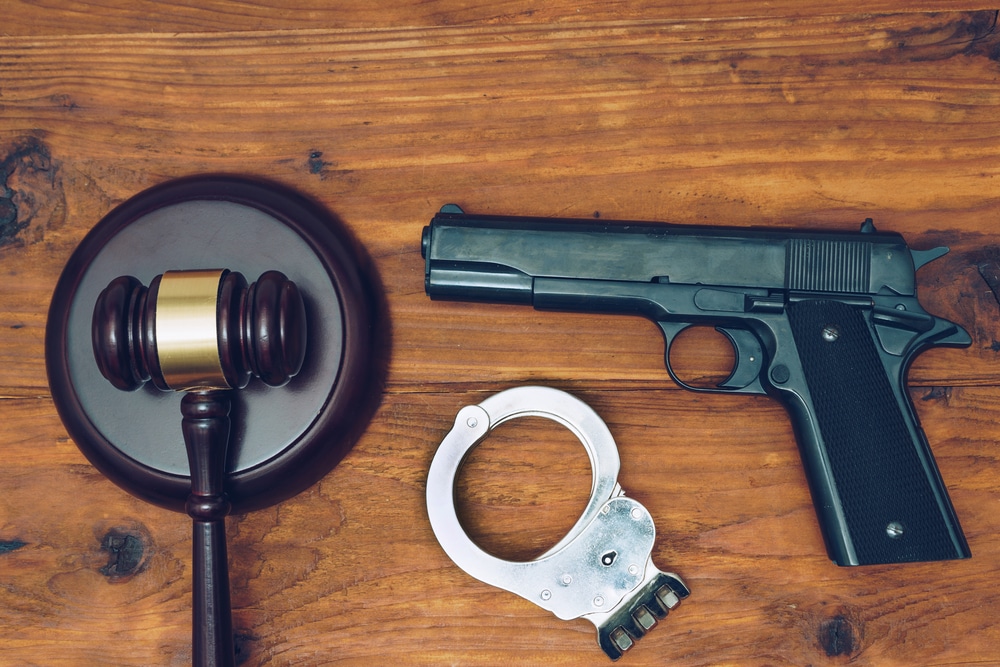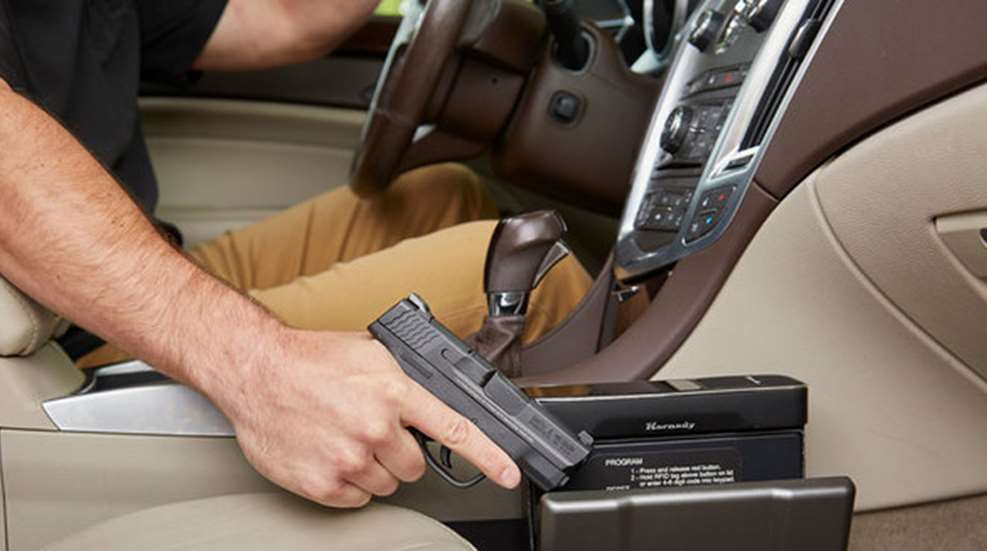In Massachusetts, transporting a firearm in your vehicle is legal only if you possess the appropriate license and adhere to specific storage and transportation laws.
Is It Legal to Carry a Gun in Your Vehicle in Massachusetts?
Yes, you can carry a gun in your car in Massachusetts, but only if you have the proper license and follow strict transport rules.
In Massachusetts, anyone who wants to carry a firearm in a vehicle must have a valid License to Carry (LTC) or Firearms Identification Card (FID), and the gun must be stored securely depending on the type of firearm and license. Worcester residents and others in Central Massachusetts should also be aware that local law enforcement, like the Worcester Police Department, may add specific conditions to your license.
What Are the Requirements for Carrying a Firearm in a Vehicle?
To legally transport a firearm in your vehicle, you must have either a License to Carry (LTC) or a Firearms Identification (FID) card.
Note that an LTC lets you carry handguns and large-capacity firearms, while an FID permits possession of non-large-capacity rifles and shotguns.
According to Massachusetts General Laws Chapter 140, Section 131C, if you’re carrying a loaded firearm under a Class A license, it must be under your direct control while in the vehicle. For Class B licenses, the firearm must be unloaded and stored in a locked trunk or secure container.
How Should Firearms Be Stored in a Vehicle?
Massachusetts law requires that firearms in vehicles must be unloaded and secured.
Acceptable storage methods include placing the firearm in a locked trunk or a locked case. This applies to all firearms, regardless of whether you have an LTC or FID.
What Are the Penalties for Improper Transportation?
Failing to comply with the state’s firearm transportation laws can lead to serious consequences, like fines ranging from $500 to $5,000, criminal charges, firearm confiscation, and revocation of your firearm license.
What Should You Do During a Traffic Stop While Carrying a Firearm?
If you’re stopped by law enforcement like the Massachusetts State Police while carrying a firearm, especially while driving Worcester County roads, follow the appropriate law enforcement interaction protocol outlined below:
How Can You Ensure Safety During the Stop?
For everyone’s safety:
- Keep your hands visible at all times.
- Avoid sudden movements or reaching for anything without informing the officer.
- Comply with all instructions the officer gives.
These practices help prevent misunderstandings and maintain a safe environment during the stop.
Should You Inform the Officer About the Firearm?
Massachusetts law does not require you to give a firearm in vehicle notification during a traffic stop (no duty to inform). However, even though there’s no Massachusetts disclosure law, voluntarily disclosing this information can show transparency and may make things go more smoothly.
How Should You Respond If Asked About Firearms in the Vehicle?
If questioned about firearms in your vehicle, assert your rights, request your lawyer, and refuse a search if possible:
- You have the right to remain silent under the Fourth Amendment.
- You can politely decline to answer without a lawyer present.
- If the officer asks to search your vehicle, you have the right to refuse unless they have probable cause.
Remember, staying calm and respectful is crucial. If you’re unsure about your rights, ask to speak with a criminal defense attorney.

What Are the Legal Implications of Carrying a Firearm Without Proper Licensing?
Under Massachusetts General Laws, carrying a firearm without the appropriate license is a serious offense. Illegal possession in a vehicle can lead to criminal penalties for unlicensed carry. It’s also important that you understand the appropriate firearm license types, because they affect how and where you can carry your firearm.
What Constitutes Unlawful Possession in a Vehicle?
Under Massachusetts General Laws Chapter 269, Section 10(a), possessing a firearm in a vehicle without a valid LTC or FID is considered unlawful. This offense can be classified as a felony, especially if the firearm is loaded or if you have prior convictions and can lead to an arrest for firearm possession in Worcester.
What Are the Potential Penalties?
Penalties for unlawful possession include:
- Jail time ranging from 18 months to 5 years.
- Fines up to $5,000.
- Revocation of any existing firearm licenses.
- A permanent criminal record, which can affect future employment and rights.
First offenses may mean fewer/lighter penalties. Repeat offenses or possession of large-capacity firearms can lead to harsher penalties.
How Can You Protect Your Rights During a Traffic Stop?
Understanding your Fourth Amendment rights, what to do when facing a vehicle search and seizure, and the legal vehicle search protocol can help.
What Are Your Rights Regarding Searches?
In Massachusetts, police can search your vehicle without a warrant if they have probable cause to believe it contains evidence of a crime. However, you have the right to:
- Refuse consent to a search if there’s no probable cause.
- Assert your rights calmly and clearly.
- Request a warrant before allowing a search.
Being aware of these rights can help you avoid unlawful searches and protect your legal interests.
Can You Remain Silent?
Yes, you have the right to remain silent to avoid self-incrimination. If you’re questioned about firearms or any other matters, you can politely state that you’d prefer to speak with an attorney before answering. This right is protected under the Miranda rights in Massachusetts.

What Steps Should You Take If Charged with a Firearm Offense?
Facing a firearm charge is serious, but taking the right steps can help you navigate the legal process effectively.
How Can an Attorney Assist You?
Hiring a criminal defense attorney, especially one familiar with Worcester courts, can provide several benefits:
- Developing a strong legal defense strategy.
- Negotiating plea deals or seeking case dismissal.
- Guiding you through court procedures and ensuring your rights are protected.
An experienced attorney can make a significant difference in the outcome of your case.
What Should You Avoid Doing?
To protect your legal interests:
- Do not represent yourself in court without legal expertise.
- Avoid making statements to law enforcement without your attorney present.
- Refrain from discussing your case on social media or with others.
These actions can inadvertently harm your defense and should be avoided until you’ve consulted with your attorney.
Additional Resources and FAQs
Staying informed about Massachusetts firearm laws is essential for responsible gun ownership.
Where Can You Find More Information on Massachusetts Gun Laws?
For detailed information, refer to:
- Massachusetts General Laws Chapter 140, Section 131C: Link
- Mass.gov Firearm Information: Link
- Worcester District Court Information: Link
These resources provide comprehensive guidance on firearm laws and licensing procedures.
Are There Exceptions for Non-Residents?
Yes, non-residents must get a temporary LTC to carry firearms in Massachusetts. This license is issued by the Massachusetts State Police and requires an application process. Federal laws may allow for interstate travel with firearms, but it’s crucial to comply with Massachusetts state laws to avoid legal issues.
Understanding and adhering to Massachusetts firearm laws is vital for your safety and legal protection. Always make sure you’re properly licensed, store and transport firearms according to state regulations, and know your rights during traffic stops. If you face any legal challenges, consult with a qualified attorney to navigate the complexities of firearm laws in Massachusetts.
